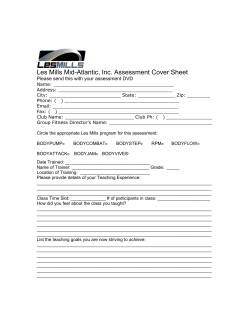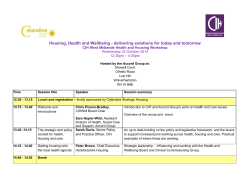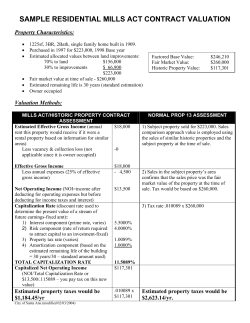
How to Become the BEST Safety Manager You Can Be!
How to Become the BEST Safety Manager You Can Be! Gary W. Olmstead PhD, CIH, CSP Olmstead HSE Services Gary@OlmsteadHSE.com Presentation’s Goal: • Overview of observations and recommendations for starting, developing, and maximizing a safety career Despite differences in workplace, age, years of experience, interest in leadership roles or educational background – there are many similarities regarding general career management. Short Biography • Education – B.A. – Biology and Psychology – PhD – Environmental Health • Work Experiences – Short time – P & G, GE and IBM – Director, Global HSE - General Mills • Teaching – University of Minnesota, School of Public Health • Foundations – AIHF General Mills Product Lines Former US Companies/Brand Names of GMI • Red Lobster • Eddie Bauer • Olive Garden • Lee Wards • 8th Continent • Talbot’s • Lloyd’s BBQ • Foot-Joy • Tom’s Snack Foods • Ship ‘n Shore • Pennsylvania House • Monet • Lionel Model Trains • Kenner Toys • Lark Luggage • Parker Brothers • O-Cel-O • Saluto Pizza • H.E. Harris Stamps • Gorton’s • Donruss • GoodMark General Mills Injury History 1975 to Date 14.00 N. A. - Total Injury Rate N. A. - Lost Time Injury Rate Global Total Injury Rate 12.00 Global Lost Time Injury Rate Injury Rate (Injuries per 100 Employees) 10.00 8.00 6.00 4.00 2.00 0.00 75 76 77 78 79 80 81 82 83 84 85 86 87 88 89 90 91 92 93 94 95 96 97 98 99 00 01 02 03 04 05 06 07 08 09 10 11 12 HSE Role at General Mills: • Workplace Safety • Fleet Safety • Industrial Hygiene • Environmental Protection • Employee Wellness • Casualty and Property Insurance • Sustainability “Enjoy what you do and you will never ‘work’ a day in your life.” Education, Training, Work Experience • Formal • Internships • On-the-job • Continuing Education – Seminars – Conferences Plan on lifelong learning! Get Certified! • CIH • CSP • CPE • CHMM • CPEA • QEP Find Your Niche • Industry • Government • Academia • Insurance • Consulting 2006 Company Meeting 10/31/2013 Slide # 13 Prioritize Your Responsibilities • Prevent safety incidents • Protect organization’s reputation • Comply with governmental regulations • Support your group’s initiatives Your career should not be a game of “Whack-a-Mole” You need to be BOTH Strategic and Tactical! Many opportunities exist for both a “Specialist” and also for the “Generalist” Remember What is Most Important • Share successes and failures – teach others • Learn from incidents • Have both a short and long term perspective • Lead by example • Take responsibility Be Prepared • The “Elevator Speech” • Emergency response • Learn to do more with less • Look for opportunities • Be proactive not just reactive Look for ways to add value to the organization’s initiatives – align your activities to support the group’s goals. Metrics • What gets measured – gets done! • Lagging indicators • Leading indicators It is absolutely critical to “sell” your programs and yourself! Don’t stake your career on just compliance issues – do what is right to protect employees, customers, your organization and the environment. Develop Relationships: • Mentors • Sounding boards • Career coaches • Life coaches • Subject matter experts • People with complimentary skills and knowledge When in a leadership role, surround yourself with good, skilled, knowledgeable people. You don’t want ‘yes’ people. Manage Risk • Identify and quantify concerns • Estimate potential cost impacts • Leverage opportunities Be part of: • Organizational leadership • Acquisition and divestiture activities • Insurance coverage decisions • Wellness • Sustainability • Enterprise risk management • CSR reporting Learn to balance “Quality” and “Acceptance” Realize that many decisions have to be based on less than perfect data. This is where knowledge and experience guide in making the best decision at the time. Benchmark your programs and your career. Perception vs. Reality • Employees • Management • Regulators • Peers It’s a Changing World • Must think worldwide • “Think Global but Act Local” • Developed countries are losing manufacturing jobs • Increasing number of service occupations • Understand cultural differences – not everyone thinks the way you do! It’s a Changing Profession • Number of practitioners • Aging workforce • Consulting Supporting the Profession • Trade groups • Associations • Foundations • Certification Groups Top Ten Career Success Factors 1. Know yourself – strengths and weaknesses 2. Lead by example 3. Actively manage your career 4. Develop a support group 5. Identify value drivers for your organization Top Ten Career Success Factors 6. Link safety activities to value drivers 7. Measure performance 8. Communicate results – recognize accomplishments 9. Follow-up (under-promise and over-deliver) 10.Take responsibility So, what does your career crystal ball tell you? Questions?
© Copyright 2025





















